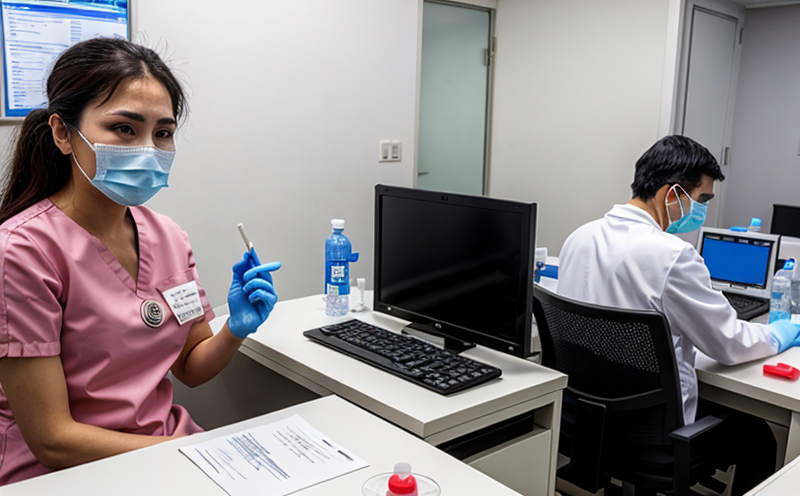Rift Valley Fever Virus Serology Testing in Livestock
Rift Valley fever (RVF) is a viral zoonotic disease caused by the Rift Valley fever virus, which belongs to the family of Bunyaviridae. This virus primarily affects domestic and wild animals, including livestock such as cattle, sheep, goats, camels, and others. RVF poses significant risks not only to animal health but also to human populations in affected regions.
The primary mode of transmission for RVF is through mosquito bites; however, direct contact with infected blood or tissues can also result in infection. The virus has a broad host range across various mammalian species and can survive long periods within the environment. Consequently, it presents an ongoing challenge to public health systems worldwide.
Serology testing plays a crucial role in diagnosing RVF by detecting antibodies produced in response to viral exposure. These tests identify whether animals have been previously exposed to or are currently infected with the virus. Accurate diagnosis enables early detection and swift intervention, which is essential for preventing outbreaks and controlling the spread of this deadly disease.
In our laboratory, we employ advanced serological techniques to perform RVF virus testing on livestock samples. Our method involves extracting antibodies from blood serum using enzyme-linked immunosorbent assays (ELISAs). This approach ensures precise identification of specific viral antigens present in the sample. The results provide valuable insights into an animal's immune response against RVF, enabling informed decisions regarding vaccination strategies and herd management practices.
The testing process typically begins with proper sample collection and preparation. Blood samples are drawn from live animals or collected post-mortem for necropsies. Following extraction, serum is separated using centrifugation before being analyzed via our ELISA kits specifically designed for detecting RVF-specific antibodies. Our laboratories adhere strictly to international standards such as ISO 17025:2017 and OIE guidelines to ensure reliability and accuracy.
Our expertise extends beyond mere diagnosis; we offer comprehensive support services tailored towards enhancing your understanding of RVF dynamics within your operations. By partnering with us, you gain access to detailed reports that outline the presence or absence of antibodies along with their titers, providing critical information for decision-making processes related to animal welfare and biosecurity measures.
Scope and Methodology
The scope of our Rift Valley Fever Virus Serology Testing in Livestock includes all relevant aspects necessary for accurate diagnosis and monitoring of RVF within agricultural settings. Our methodology encompasses several key components:
- Sample preparation: Properly collecting, handling, and processing blood samples from affected animals.
- Viral antigen extraction: Isolating specific viral antigens from the extracted serum.
- Serological assay: Utilizing ELISA kits to detect RVF-specific antibodies in the sample.
Our laboratory follows stringent protocols outlined by recognized organizations like ISO 17025 and World Organization for Animal Health (OIE) recommendations. These guidelines ensure consistency, repeatability, and accuracy across all tests conducted in our facility.
| Test Component | Description |
|---|---|
| Sample Collection | Live animal blood draw or post-mortem necropsy. |
| Viral Antigen Extraction | Centrifugation followed by antigen isolation techniques. |
| Serological Assay | ELISA testing for RVF-specific antibodies. |
The combination of these procedures allows us to deliver reliable results that contribute significantly to the overall management and control efforts against Rift Valley fever in livestock populations.
Quality and Reliability Assurance
At our laboratory, maintaining high standards of quality and reliability is paramount. We are certified under ISO 17025:2017, ensuring that all our procedures comply with internationally recognized best practices for analytical laboratories.
To further enhance accuracy and precision, we utilize state-of-the-art equipment and reagents recommended by global health bodies like the OIE. Our team consists of highly qualified professionals who undergo continuous training to stay updated on the latest advancements in diagnostic techniques.
Regular audits and internal reviews are conducted to identify any potential areas for improvement. Feedback from clients is actively sought out, allowing us to refine our services continually based on real-world feedback. Additionally, we participate in proficiency testing programs organized by recognized bodies such as AABV (American Association of Veterinary Laboratory Diagnosticians) to validate the performance of our laboratory.
By adhering strictly to these measures, we guarantee that every test conducted in our facility meets the highest levels of quality assurance and reliability. This commitment ensures that you receive accurate results that can be confidently acted upon for effective RVF management strategies.
Use Cases and Application Examples
- Vaccination Monitoring: Regular serological testing helps monitor the efficacy of vaccination programs by tracking antibody titers over time.
- Epidemic Surveillance: In regions prone to RVF outbreaks, frequent sampling allows for early detection of emerging infections.
- Herd Health Management: Routine testing enables proactive identification of infected animals, facilitating timely isolation and treatment.
- Prediction Modeling: Combining serological data with other epidemiological indicators can aid in predicting future outbreaks based on historical patterns.
The table below provides a summary of different scenarios where our Rift Valley Fever Virus Serology Testing service proves particularly beneficial:
| Scenario | Description |
|---|---|
| Vaccination Campaign Evaluation | Evaluating the effectiveness of vaccination campaigns through antibody titer analysis. |
| Outbreak Investigation | Determining the source and extent of an RVF outbreak using serological data from infected areas. |
| Herd Health Assessment | Identifying potential carriers within a herd to prevent further spread of the disease. |
| Prediction Model Development | Gathering historical antibody data to inform predictive models for future outbreak predictions. |
These applications highlight how our specialized serology testing contributes to comprehensive RVF management plans across various sectors within the agricultural industry.





